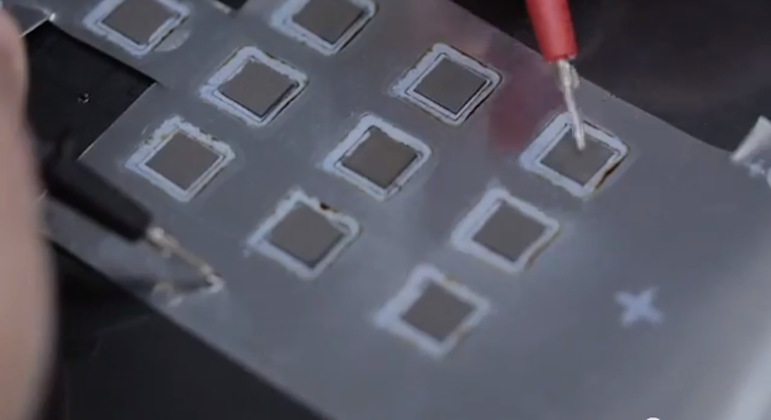Flexible, ultra-thin batteries in works for wearable tech
Californian startup edges closer to bringing printable zinc battery to market

Imprint Energy has secured $6 million in funding as the firm takes a significant step in bringing its flexible, paper-thin battery technology to market.
The technology will help device manufacturers make thinner, more flexible wearable devices as they will no longer be limited by bulky Li-Ion battery packs.
Instead of making incremental improvements to existing battery technology, scientists at Imprint Energy developed a printable Zinc battery capable of recharging.
Dubbed ZincPoly, the solid-state technology can be printed in a range of sizes and shapes, and is wafer-thin and flexible. Crucially, the high density cells are capable of outperforming conventional batteries and have a lifetime comparable to Li-On counterparts.
Other advantages of Zinc include its non-toxic nature and low development costs, as the material is abundant. It's also robust, with batteries able to continue functioning when they are compressed or even punctured.
There is no time frame for when the technology will make it to market, but Imprint Energy has confirmed the funds will be used to accelerate development and secure design wins in the wearable tech and Internet of Things markets.
Get the ITPro daily newsletter
Sign up today and you will receive a free copy of our Future Focus 2025 report - the leading guidance on AI, cybersecurity and other IT challenges as per 700+ senior executives
-
 Should AI PCs be part of your next hardware refresh?
Should AI PCs be part of your next hardware refresh?AI PCs are fast becoming a business staple and a surefire way to future-proof your business
By Bobby Hellard Published
-
 Westcon-Comstor and Vectra AI launch brace of new channel initiatives
Westcon-Comstor and Vectra AI launch brace of new channel initiativesNews Westcon-Comstor and Vectra AI have announced the launch of two new channel growth initiatives focused on the managed security service provider (MSSP) space and AWS Marketplace.
By Daniel Todd Published
-
 Wearables: First Windows 10 smartwatch is on its way, and it means business
Wearables: First Windows 10 smartwatch is on its way, and it means businessNews Specs are hard to come by, but we know it will be built on Microsoft's Windows 10 IoT OS
By Dale Walker Published
-
 The best wearable devices for business
The best wearable devices for businessBest The best lightweight devices to help you stay productive during a busy workday
By Dale Walker Published
-
 Apple Watch Series 2 review: First look
Apple Watch Series 2 review: First lookFirst look If you waited for the second generation, you haven't wasted your time
By Jane McCallion Published
-
 Apple watchOS 3 release date and features: watchOS 3 update available on 13 September
Apple watchOS 3 release date and features: watchOS 3 update available on 13 SeptemberRumours watchOS 3 can be downloaded from Tuesday next week
By Jane McCallion Published
-
 Apple Watch release date, price, features, availability and delivery date: Special edition Apple Watch bands arrive for the Olympics
Apple Watch release date, price, features, availability and delivery date: Special edition Apple Watch bands arrive for the OlympicsRumours But will only be available in Brazil
By Maggie Holland Published
-
 Fitbit patents ruled invalid in Jawbone lawsuit
Fitbit patents ruled invalid in Jawbone lawsuitNews ITC judge recommends case be thrown out
By Adam Shepherd Published
-
 Fitbit steps up its game with mobile payments acquisition
Fitbit steps up its game with mobile payments acquisitionNews NFC payment technology could be coming to future Fitbit wearables
By Jane McCallion Published
-
 Wearables success comparable to tablets, YouGov says
Wearables success comparable to tablets, YouGov saysNews The organisation revealed six per cent of the population have at least one wearable
By Clare Hopping Published